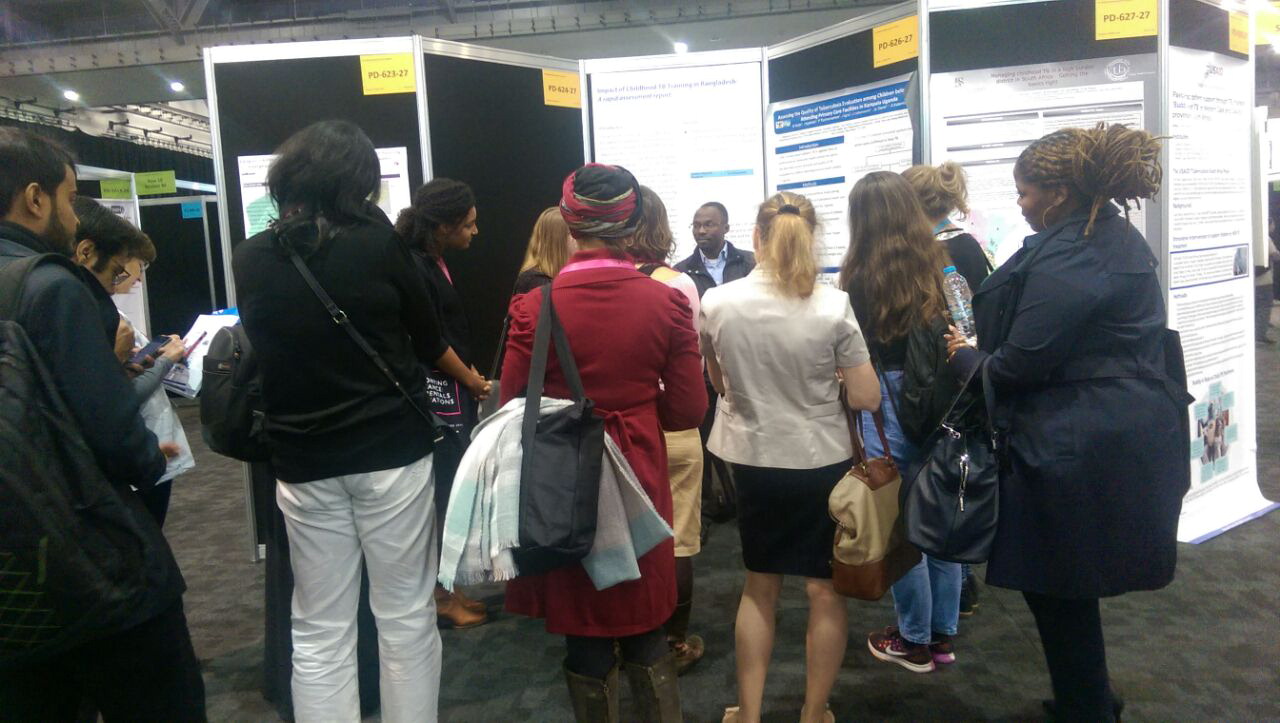|
PARTNERSHIPS FOR ENHANCED ENGAGEMENT IN RESEARCH (PEER) HEALTH
Cycle 1
Principal Investigator: Achilles Katamba, Makarere University NIH-Supported Collaborator: Adithya Cattamanchi, University of California, San Francisco Title of NIH Award: TB Guideline Observation and Adherence in Low Income Countries (TB GOAL) Project Dates: October 2013 - April 2019
Project Overview:
 | | Kizito Samuel, a GHES Fellow, presenting poster at the 47th Union Meeting in Liverpool, UK in October 2016. (photo courtesy of PI Katamba) |
Uganda has an estimated 67,000 annual TB cases (approximately 193 per 100,000 persons) but has among the lowest case detection and treatment success rates of the 22 high-burden countries. Moreover, case detection and reporting among children is virtually non-existent. The 2010 Desk Guide for Diagnosis and Management of TB in Children, developed with USAID funding, is an evidence-based, simple decision aid to improve early and accurate identification of children with TB in resource-constrained settings. However, uptake of the Desk Guide had been limited as of the start date of this PEER project in 2013, and little was known at that time about how best to facilitate implementation in routine practice settings. The goal of this project was therefore to develop and evaluate an intervention to facilitate successful adoption of the Desk Guide at primary health centers in Uganda. The studies took place at six Kampala City Council Authority clinics, representative of urban primary care centers in sub-Saharan Africa. The team tested the overall hypothesis that a multi-faceted intervention will increase the proportions of children identified as TB suspects, child TB suspects evaluated for TB, and children diagnosed and reported as TB cases. The research aligned with USAID Uganda’s goal of strengthening health systems and improving the delivery of health services, and it sought to provide USAID and the Ugandan government with important information on factors that influence Desk Guide use and strategies to promote its uptake at primary level health facilities.
Final Summary of Project Activities
The team worked at six Kampala Capital Authority (KCCA) health facilities across the project period. The intervention included a two-hour Continuing Medical Education (CME) with all clinicians at each health facility, followed by a daily one-hour on-the-job coaching session on how to evaluate children for TB. Pediatricians worked with clinicians for seven weeks at each health facility. The researchers also distributed a printed health care guide on the management of tuberculosis in children, and a step-by-step process for the diagnosis of TB in children, placing them where children were being evaluated in the primary health care clinic.
The PEER team provided support and performance feedback for evaluating children for TB through monthly reports. These reports included the number and proportion of children diagnosed and treated for TB, as well as process indicators like the number and proportion of children screened for TB and number and proportion of children tested for TB if only one symptom was present. Of the 24,566 children enrolled in the study, 47% were fully screened for TB symptoms, 15% were screened positive, and of those 80% initiated treatment. Although there were large gaps in the pathway of diagnosis and treatment, the PEER team found that the TB Desk Manual had been implemented with success at their six study sites around Kampala.
The researchers developed databases of patient record forms for both pre-intervention and post-intervention study periods and conducted a post-intervention assessment of knowledge, attitudes, and self-efficacy of health care workers at the six clinics. The team also published their findings in peer-reviewed journals and received several additional grants for other related work, totaling more than $700,000.
Publications
S. Kizito, A. Katamba, C. Marquez, P. Turimumahoro, I. Ayakaka, J.L. Davis, and A. Cattamanchi. 2018. Quality of care in childhood tuberculosis diagnosis at primary care clinics in Kampala, Uganda. The International Journal of Tuberculosis and Lung Disease 22(10): 1196-1202. https://doi.org/10.5588/ijtld.18.0043
Irene Ayakaka, Sara Ackerman, Joseph M. Ggita, Phoebe Kajubi, David Dowdy, Jessica E. Haberer, Elizabeth Fair, Philip Hopewell, Margaret A. Handley, Adithya Cattamanchi, Achilles Katamba, and J. Lucian Davis. 2017. Identifying barriers to and facilitators of tuberculosis contact investigation in Kampala, Uganda: a behavioral approach. Implementation Science 12:33. https://doi.org/10.1186/s13012-017-0561-4
Health Cycle 1 Recipients
|




